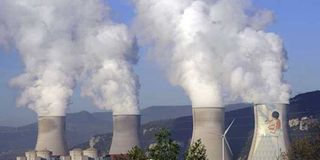Nuclear power negates hope for prosperity

Nuclear power plants. Investing in nuclear energy is betting on disaster. PHOTO | FILE | AFP
What you need to know:
- For Kenya to achieve its prosperity dreams, there is a need to adopt energy production options that will stimulate manufacturing.
- For a country where solid waste management is a big problem, radioactive waste from a nuclear power plant will pose a massive challenge.
The Bill providing for the Kenya Nuclear Electricity Board (Kneb) received Cabinet approval a few weeks ago, setting the country on a path to developing a 1,000-megawatt nuclear power plant in Lake Victoria, Lake Turkana or Coast regions.
The reason for considering these three locations rests on the premise that power plants fuelled by coal, natural gas, oil and nuclear fission boil water to produce steam, which turns a turbine to generate electricity.
Nuclear power generation is the most water-intensive fuel option. While cooling systems account for the vast amount of water, fuel extraction and refining affect water sources.
Uranium fuel extraction, for example, requires a substantial amount. Uranium mining also contaminates surface and groundwater sources.
WATER
Developing nuclear power plants will add pressure to the constrained water resources in Kenya, caused mainly by years of recurrent droughts and a sharp increase in demand resulting from a high population growth.
Thousands do not have access to clean, safe and adequate water. Lack of rainfall also affects the ability to acquire food and has led to violence in some parts of the country.
Nuclear energy is the most expensive way to produce electricity, leading to it often being described as “the most expensive way to boil water”.
For Kenya to achieve its prosperity dreams, there is a need to adopt energy production options that will stimulate manufacturing.
Nuclear power production will increase the already soaring energy prices and drive investors away. The cost of products will increase further, affecting the quality of life and livelihoods of Kenyans.
DISASTER
Nuclear power plants pose a substantial risk of accidents. With Kenya’s poor disaster management credentials, no insurer will be keen to cover a nuclear power plant in the country.
This leaves the government and the taxpayers to shoulder the risk. A major nuclear accident could cost trillions of shillings.
The Chernobyl disaster in Ukraine, for instance, was estimated to have cost more than Sh23 trillion.
One such accident would wreck Kenya’s economy. Kenya is, surprisingly, pursuing energy production technologies — coal and nuclear — that have been surpassed by the expansion of renewable energy technologies such as wind and solar.
More shocking, the country has a huge potential for wind and solar power, which would increase its energy independence at a lower cost.
WASTE
But instead of increasing its solar and wind power projects, Kenya is investing in outdated, dirty and costly energy options such as coal and nuclear.
For a country where solid waste management is a big problem, radioactive waste from a nuclear power plant will pose a massive challenge.
With the immense terrorist threats, its nuclear reactors would also be vulnerable to attacks. This puts citizens’ safety at stake.
Renewable energy provides many opportunities to mitigate the effects of climate change, attain energy independence and safeguard the environment.
However, investing in nuclear energy is betting on disaster.
Mr Wemanya is a Greenpeace Africa Campaigner. [email protected]





